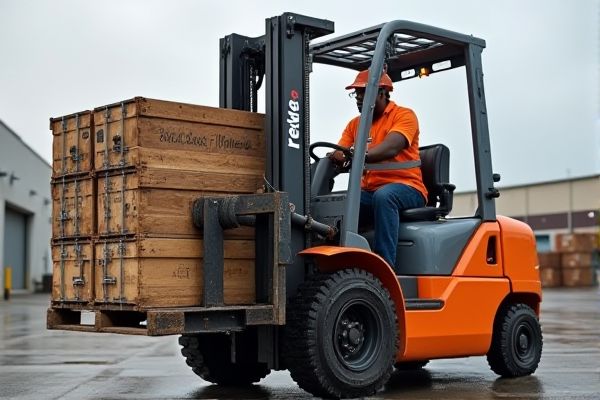
Forklift operator job opportunities in Nigeria are increasing, driven by the growth of industries such as manufacturing, warehousing, and logistics. Many companies seek skilled operators to manage materials efficiently and maintain safety standards. Job seekers can find openings on various online job portals, or through recruitment agencies specializing in industrial roles. Certification programs are available to enhance skills and improve employability, making candidates more attractive to potential employers.
Job Description
A forklift operator in Nigeria is responsible for efficiently operating forklifts to move, locate, stack, and count merchandise. This role requires adherence to safety regulations and guidelines to ensure a secure work environment. Operators must maintain their equipment in optimal condition, performing routine checks and reporting any issues to management. Strong communication skills and the ability to work collaboratively with team members will enhance your effectiveness in fulfilling daily operational tasks.
Requirement
A forklift operator in Nigeria typically requires a minimum of a secondary school education, although vocational training or certification in forklift operation is highly beneficial. Employers often seek candidates with a valid forklift operating license, which demonstrates competence and adherence to safety standards. Experience in warehouse or industrial environments can enhance your employability, as familiarity with loading and unloading goods is crucial. Knowledge of safety regulations and equipment maintenance is essential to ensure a safe working environment and efficient operation.
Salary and Perks Expected
Forklift operators in Nigeria can expect a salary range between N60,000 to N150,000 monthly, depending on experience and industry. Benefits often include health insurance, overtime pay, and opportunities for career advancement. Many employers also provide training programs to enhance skill sets, fostering long-term employment. Understanding these factors can help you negotiate better compensation and benefits when applying for a forklift operator position.
Similar Job Names
- Forklift Operator
- Warehouse Forklift Driver
- Reach Truck Operator
- High Reach Forklift Operator
- Material Handling Equipment Operator
- Production Forklift Driver
- Industrial Forklift Driver
- Logistics Forklift Operator
- Forklift Technician
- Yard Operator
- Forklift Trainer
- Supply Chain Forklift Operator
- Construction Forklift Operator
- Bulk Forklift Operator
- Electric Pallet Jack Operator
Job Expectation Concept
Forklift operators in Nigeria are expected to possess a strong understanding of safety protocols and equipment operations specific to their working environment. Proficiency in handling various types of goods, including fragile or hazardous materials, is crucial for maintaining workplace efficiency and reducing accidents. Employers often seek candidates with relevant certifications and experience, as these qualifications enhance workplace safety and operational flow. Your engagement in continuous training and adherence to best practices can significantly boost both your career prospects and the overall productivity of the facility.
Career Advantage and Weakness
The role of a forklift operator in Nigeria presents strong career advantages, including high demand in various sectors such as construction, logistics, and manufacturing. Operators can enjoy competitive salaries and opportunities for advancement, particularly as many companies seek skilled workers to enhance productivity. Challenges in this profession often include the physical demands of the job, potential hazards associated with operating machinery, and the need for continuous skill improvement to adapt to emerging technologies. Safety training and certification are crucial for minimizing risks and ensuring compliance with local regulations, which can further enhance your employability.
Important Thing Must Know
Forklift operator jobs in Nigeria require specific skills and qualifications, including a strong understanding of safety protocols and equipment handling. Training programs and certification are essential for ensuring compliance with Nigerian safety standards and regulations. Operators must be familiar with warehouse operations, logistics, and proper loading techniques to enhance efficiency. Employers often seek individuals with good physical fitness, attention to detail, and the ability to work well under pressure. Pursuing opportunities in this field can lead to stable employment and career advancement in Nigeria's growing logistics sector.
Alternative Career Options
Forklift operators in Nigeria can explore various alternative career options that leverage their skills in material handling and logistics. Opportunities in warehouse management allow for the utilization of experience in managing inventory and overseeing storage operations. Transitioning into supply chain management provides a broader perspective on logistics, offering roles that involve planning and coordinating the flow of goods. Additionally, pursuing a career in equipment maintenance or logistics technology can enhance technical skills and open doors to specialized positions within the industry.
Companies List
- Dangote Group
- Nigerian Breweries
- Flour Mills of Nigeria
- Unilever Nigeria
- Nestle Nigeria
- Coca-Cola Nigeria
- Total Nigeria
- Julius Berger Nigeria
- Lafarge Africa
- Procter & Gamble Nigeria
List of Ideal City
Lagos, Nigeria's largest city, offers extensive logistics and warehousing opportunities, making it an excellent place for forklift operators. Port Harcourt, a hub for the oil industry, has multiple warehouses and distribution centers, creating high demand for skilled operators. Kano, known for its agricultural production, provides jobs in food processing and storage facilities, enhancing job prospects in this field. Abuja, the capital, features numerous construction projects and infrastructure developments, further increasing the need for reliable forklift operation.
 jobs-nigeria.com
jobs-nigeria.com